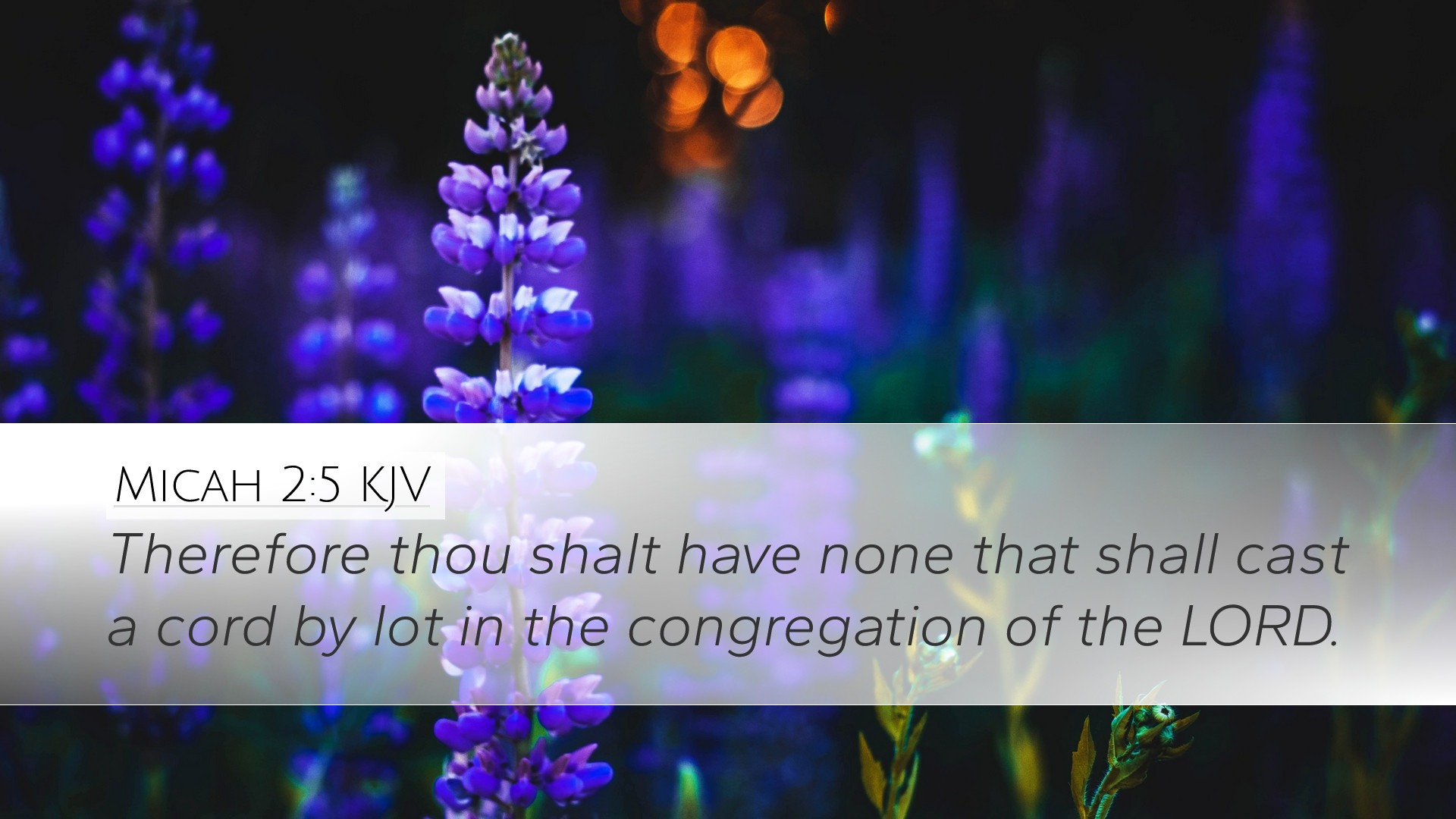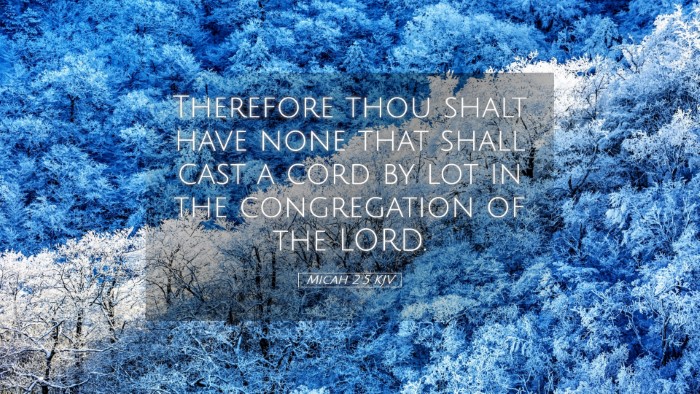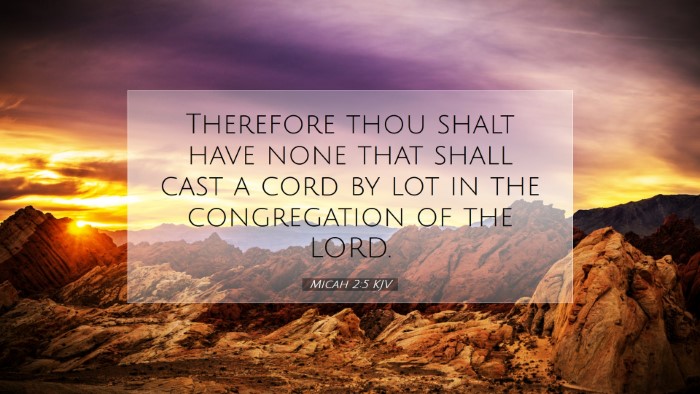Old Testament
Genesis Exodus Leviticus Numbers Deuteronomy Joshua Judges Ruth 1 Samuel 2 Samuel 1 Kings 2 Kings 1 Chronicles 2 Chronicles Ezra Nehemiah Esther Job Psalms Proverbs Ecclesiastes Song of Solomon Isaiah Jeremiah Lamentations Ezekiel Daniel Hosea Joel Amos Obadiah Jonah Micah Nahum Habakkuk Zephaniah Haggai Zechariah MalachiMicah 2:5
Micah 2:5 KJV
Therefore thou shalt have none that shall cast a cord by lot in the congregation of the LORD.
Micah 2:5 Bible Commentary
Commentary on Micah 2:5
Verse Reference: Micah 2:5 - "Therefore thou shalt have none that shall cast a cord by lot in the congregation of the Lord."
Introduction
The Book of Micah serves as a profound testament to the prophetic calling to confront injustice and bring hope to the people of Israel. Specifically, Micah 2:5 addresses the plight of the people amidst social corruption and moral decay. This commentary seeks to draw insights from public domain resources while elucidating the implications of this verse for contemporary understanding.
Contextual Background
The socio-political context of Micah's prophecy is essential for a deeper understanding. Micah prophesied during a tumultuous period in Israel's history, characterized by rampant injustices, particularly by those in positions of authority. His ministry, though largely prophetic in nature, was directed towards calling the people of Israel back to covenant faithfulness.
Historical Overview
- Timelines: Micah's ministry likely took place between 735 and 700 BC, a time overlapping with the reigns of Kings Jotham, Ahaz, and Hezekiah in Judah.
- Geographic Focus: The prophetic messages in Micah often focus on both the Northern Kingdom (Israel) and the Southern Kingdom (Judah) as they faced imminent threats from Assyria.
Verse Analysis
Micah 2:5 encapsulates a judgment against the leaders and people of Israel. The phrase "thou shalt have none that shall cast a cord by lot" denotes a denial of inheritance and the customary practices of divining God’s will for the distribution of land and resources among the people. This act speaks volumes about the desolation that the people will face as a consequence of their injustice.
Key Themes
- Judgment: This verse is a declaration of judgment against the corrupt social order, particularly focusing on the leaders who exploit their position.
- Loss of Inheritance: The mention of "casting a cord" indicates the loss of the rightful claim to their inheritance, a key element of covenant fidelity in Israel.
- Divine Silence: The absence of a lot may imply God's withdrawal from guiding the nation, leading to a state of spiritual desolation.
Commentary Insights
Matthew Henry's Perspective
Matthew Henry emphasizes the gravity of the situation by highlighting the loss of community due to moral failure. He notes that the leaders’ actions have led to a withdrawal of God’s presence among His people. Henry underscores that the casting of lots was a practice intended to reflect God's will, but once corrupted, aligns with the theme of divine judgment.
Albert Barnes' Commentary
Albert Barnes approaches this verse with a focus on the social ramifications of the injustices perpetrated by the leaders. He suggests that casting lots was integral for fair distribution, and the inability to do so represents a breakdown of societal structures. Barnes further discusses the implications of this verse as a warning to both leaders and followers about the consequences of straying from divine principles.
Adam Clarke's Interpretation
Adam Clarke explores the prophetic warning embedded in this verse, articulating that the loss of the lot signifies a severe punishment from God. Clarke draws comparisons between the ancient practices of allocation within the community and their ultimate spiritual decline. He posits that sincere repentance is the only remedy to restore their covenant relationship with God.
Theological Implications
This verse challenges readers today, especially church leaders, to reflect on their stewardship and responsibility. The direct consequences of social injustice extend beyond immediate effects; they reverberate through the community and impact the spiritual health of the populace.
Responsibility of Leaders
Leaders are called to lead with integrity, ensuring that justice prevails within their communities. The condemnation of corrupt practices in Micah is a timeless reminder of the expectations placed upon leaders by God.
Covenant Faithfulness
Micah’s prophecy reiterates the necessity of remaining faithful to one’s covenant with God. The loss of the lot symbolizes a complete upheaval of God’s intended order, where His blessings are contingent upon the people’s adherence to divine standards.
Conclusion
Micah 2:5 serves as an evergreen reminder of the stakes involved in moral failures, particularly for those in leadership. The insights derived from the commentaries of Matthew Henry, Albert Barnes, and Adam Clarke provide a deep reservoir of understanding that speaks directly to the heart of biblical justice and community integrity. As we reflect on this passage, let us commit to upholding righteousness, ensuring our actions align with God’s will.


